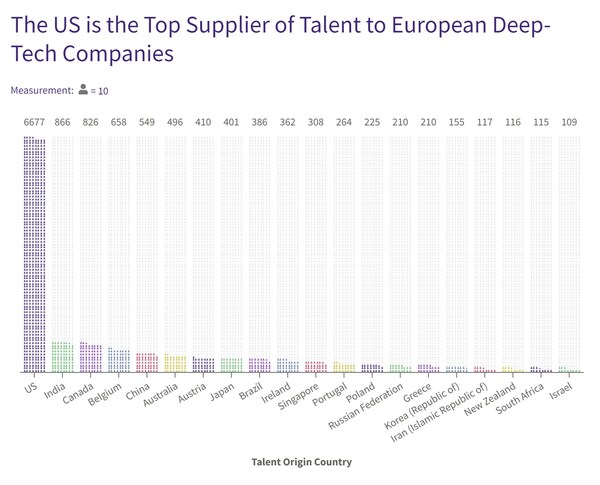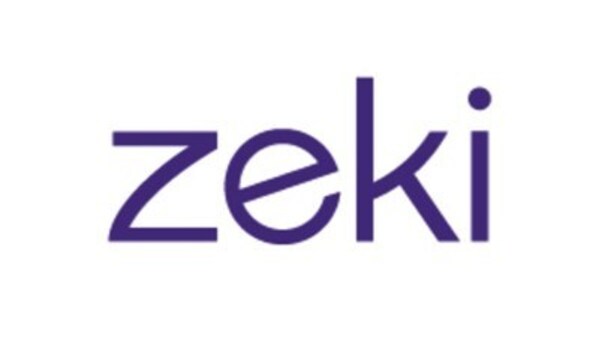 |
딥테크 생태계 내 경쟁을 분석하는 새로운 제키 데이터(Zeki Data) 보고서
런던, 2024년 9월 25일 /PRNewswire/ -- 제키 데이터가 오늘 발표한 딥테크 인재에 관한 새로운 글로벌 보고서에 따르면 미국은 영국보다 3배나 많은 딥테크 기업을 창출하고 있으며, 유럽의 소규모 스타트업에는 북미보다 훨씬 더 많은 고급 기술 인재가 집중되어 있는 것으로 나타났다.
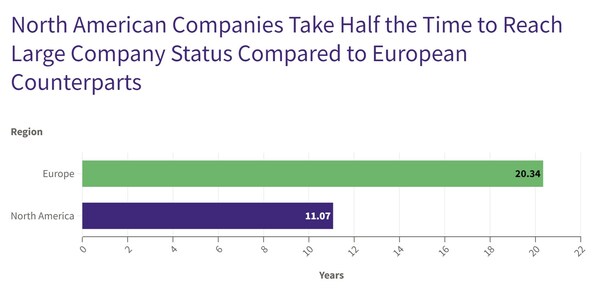
North American Startups Scale 2x Faster than European: Deep-tech startups in the United States are scaling twice as fast as European counterparts.
딥테크 인재 전쟁: 유럽 대 북미 대결 2024 보고서는 인재를 렌즈로 삼아 유럽과 북미 간 딥테크의 근본적인 트렌드를 조명한다. 이 보고서는 2020년 이후 새로운 딥테크 기업의 성장이 급격히 둔화되고 있음을 보여준다.
영국에 본사를 두고 딥테크 기업의 미래 잠재력을 평가하여 투자 및 인재 영입을 지원하는 딥테크 데이터 기업인 제키 데이터는 보고서를 통해 각국이 국가 번영과 안보의 다음 단계를 뒷받침할 혁신 기술 분야에서 주권적 역량을 구축하는 열쇠로서 인재 유치 및 보유의 필요성을 깨닫고 있다고 밝힌다.
제키 데이터의 CEO이자 공동 설립자인 톰 허드(Tom Hurd)는 "딥테크 기업이 혁신의 포부를 실현하는 데 필요한 한정된 과학 및 엔지니어링 인재를 확보하기 위한 경쟁이 치열하다"면서 "정부는 혁신적 우위를 확보하기 위해 딥테크 스타트업에 자금을 투입하고 있지만, 제키의 데이터에 따르면 높은 자본 비용과 시장 통합이라는 역풍이 불면서 ROI는 제한적"이라고 말했다.
허드는 "가장 혁신적인 인재를 유치하고 보유하는 것이야말로 딥테크 기업의 미래 혁신 잠재력을 보여주는 가장 좋은 지표"라고 하면서 "이는 국가와 기업 모두의 우선 순위가 되어야 한다"고 덧붙였다.
딥테크 인재 전쟁 보고서는 6,100개 이상의 가장 중요한 유럽 및 북미 딥테크 기업의 진화 과정과 신기술 선점 경쟁의 전략적 의미에 대한 연구가 미흡하다는 점에 초점을 맞추고 있다. 제키는 이들 기업이 전 세계적으로 고용하고 있는 8,795,902명의 직원, 특히 고도의 기술을 보유한 227,948명의 직원에 대해 조사했다.
제키 데이터 보고서의 주요 조사결과
1. 스타트업 성장을 촉진하지 못하는 정부 투자: 2020년 이후 유럽과 북미에서 새로운 딥테크 기업의 설립이 급격히 둔화되고 있다. 각국은 딥테크 혁신의 속도를 높이기 위해 대규모 재정 투자를 아끼지 않았으나, 높은 자본 비용과 시장 통합이라는 역풍이 불면서 정부 산업 정책의 효과도 약화되었다.
2. 저비용 고용을 우선시하는 매그니피센트 7: 생성형AI가 주도하는 시장 통합으로 인해 아마존, 애플, 구글, 메타, 마이크로소프트, 엔비디아, 테슬라 등에서 극적인 고용 변화가 일어나고 있다. 딥테크 기업들은 초기 경력의 저비용 고용을 선호하고 고비용의 경력직 채용을 줄이고 있다.
3. 유럽보다 2배 빠른 미국 스타트업의 확장: 미국의 딥테크 스타트업은 유럽 스타트업보다 2배 빠르게 규모를 확장하고 있다
4. 확장에 어려움을 겪는 엔지니어링 생명공학 기업: 엔지니어링 생명공학 기업은 중대형 기업으로 성장하는 데 어려움을 겪고 있으므로 여전히 매력적인 인수 대상이다.
5. 파열하는 배터리 기술: 2019년부터 시작된 친환경 에너지 인재 이탈에 앞서, 재생 에너지는 2022년 이후 이 분야를 빠르게 떠나는 고용자 수에서 알 수 있듯이 인재들의 선호도가 떨어지고 있다
6. 대세인 소프트웨어 엔지니어링: 반도체, 항공우주, 방위 산업 기업들은 최고의 소프트웨어 엔지니어링 인재를 확보하기 위해 치열한 경쟁을 벌이고 있으며, 사이버 보안 분야에서는 소프트웨어 인재보다 영업을 우선시하는 기업이 많은 것으로 나타났다.
7. 서구를 떠나는 중국 인재: 국가 차원에서 중국 딥테크 인재의 서구 기업 이탈이 가속화되고 있다. 중국은 유럽과 북미의 딥테크 기업을 떠나는 중국 인재들이 선택하는 목적지로 확고히 자리 잡았다.
전체 보고서는 zekidata.com/talentwar에서 무료로 다운로드할 수 있다.
제키 데이터
제키 데이터는 영국에 본사를 둔 딥테크 데이터 회사로, 딥테크 기업의 미래 잠재력을 평가하여 투자 및 인재 영입을 지원한다. 제키의 데이터에는 AI, 양자 컴퓨팅, 데이터 엔지니어링, 반도체, 의료 기술 등 첨단 분야를 전문으로 하는 1,000만 명 이상의 유수 과학자, 엔지니어, 연구원이 포함되어 있다. 조직들은 제키 데이터를 활용하여 인재 영입 프로세스와 혁신 파이프라인을 최적화하고, 개별 기업의 혁신의 질, 모멘텀, 미래 방향에 대한 새롭고 정량적인 정보를 얻을 수 있다.
당사는 각 전문가를 평가하기 위해 20개의 맞춤형 지표를 개발하여, 이들의 전문 분야를 자세히 설명하고 직업적 영향력, 기술 숙련도, 경력 과정, 포부, 평판 및 미래 잠재력을 평가한다. 당사의 고객층은 투자자, 기업 전략가, 인사팀, 정부 기관을 아우르며, 모두 진화하는 기술 환경에서 앞서 나가기 위해 제키의 정보를 활용하고 있다.
상세 정보는 www.zekidata.com에서 입수 가능하다.
인포그래픽- https://mma.prnasia.com/media2/2513003/Zeki_Research_1_Infographic.jpg?p=medium600
인포그래픽 - https://mma.prnasia.com/media2/2512999/Zeki_Research_2_Infographic.jpg?p=medium600
인포그래픽 - https://mma.prnasia.com/media2/2513000/Zeki_Research_3_Infographic.jpg?p=medium600
인포그래픽 - https://mma.prnasia.com/media2/2513002/Zeki_Research_4_Infographic.jpg?p=medium600
인포그래픽 - https://mma.prnasia.com/media2/2512998/Zeki_Research_5_Infographic.jpg?p=medium600
인포그래픽 - https://mma.prnasia.com/media2/2513004/Zeki_Research_6_Infographic.jpg?p=medium600
인포그래픽 - https://mma.prnasia.com/media2/2513005/Zeki_Research_7_Infographic.jpg?p=medium600
로고 - https://mma.prnasia.com/media2/2463194/Zeki_Logo.jpg?p=medium600
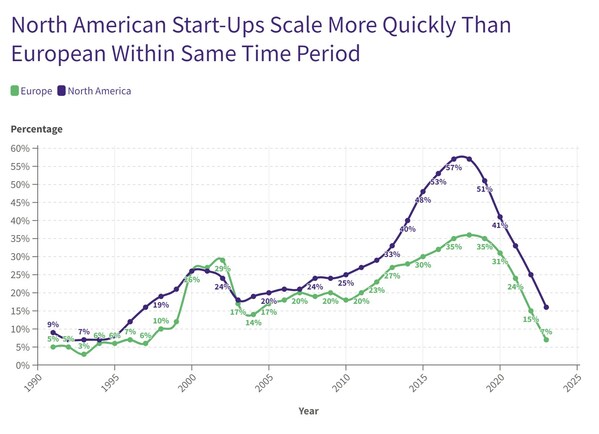
New company formation since 2000 has been the same in North America and Europe. However, when we look at the annual growth rates of hiring advanced-skilled, deep-tech talent, North American companies have scaled much faster than their European equivalents.
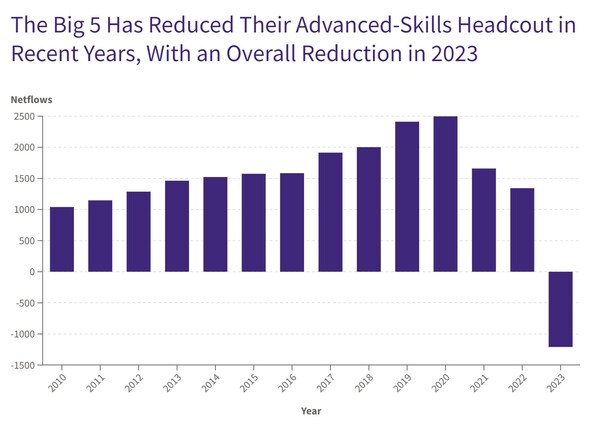
Historically, deep-tech companies have been the main destination for global talent with advanced skills. However, this is not the case in recent years, with a dramatic drop in numbers joining deep-tech companies in the past two years.
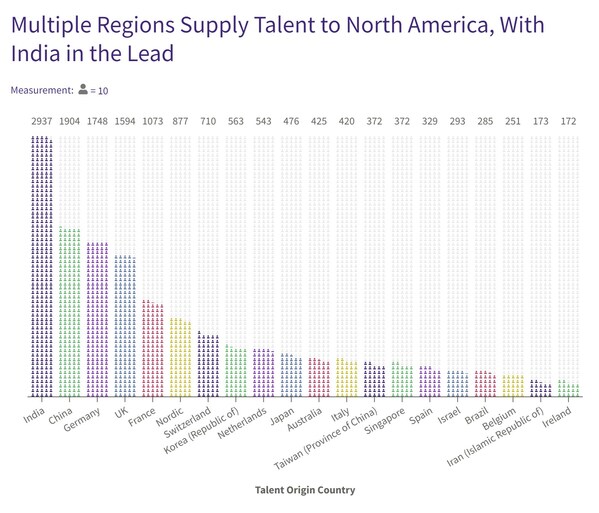
North American companies can attract European nationals, especially those specialising in AI, although this has tailed off in recent years. However, the main alternative source of talent for North American companies is India, and to a secondary extent, China, and wider Asian countries.
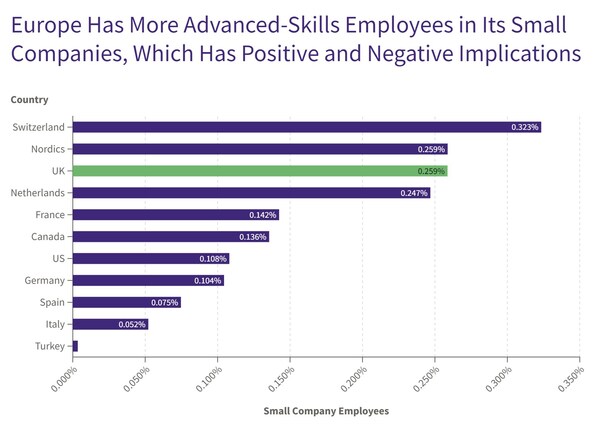
Europe shows a much higher percentage of small companies and attract up to three times more of the productive pool of advanced-skills, deep-tech talent in their country of origin than in the US. However, this is a mixed blessing as European governments increasingly execute industrial policies to promote deep-tech at home, they run the risk of creating 'zombie start-ups': employing finite, hard-to-find human resources while increasing relying on government support.
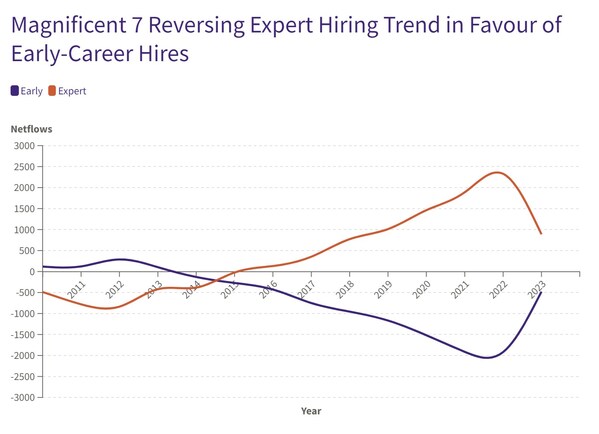
This shift to hiring early-career talent reserves a trend across the Magnificent Seven going back to 2014. It is also a general trend across deep-tech as companies, for different reasons, seek to make the most efficient use of free cash flow as they face new challenges after the COVID-19 pandemic, be they technical or financial.


